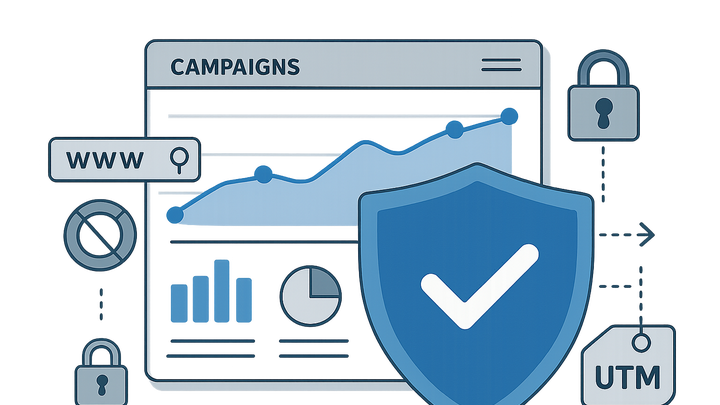Published on 2025-06-29T19:41:57Z
What is Data Privacy in Campaign Tracking & Analytics?
Data Privacy in campaign tracking & analytics refers to the policies and technical measures used to protect personal and behavioral data collected from users during marketing campaigns. It encompasses compliance with regional and international regulations (GDPR, CCPA, ePrivacy) as well as implementing privacy-by-design principles. As marketers track clicks, pageviews, and conversions, they must ensure that personally identifiable information (PII) is not collected or stored without explicit consent and that data is anonymized when possible. With the rise of cookie-free analytics solutions such as Plainsignal, businesses can gather key metrics without relying on tracking cookies or third-party identifiers. Similarly, tools like UTMGuru allow teams to generate and manage UTM parameters responsibly—avoiding PII in URLs and securely storing campaign metadata. Ensuring robust data privacy fosters user trust, reduces legal risks, and enables marketers to gain insights while upholding ethical standards. Privacy-focused tracking strategies balance the need for actionable data with respect for individual rights.
Data privacy
Protecting user data in campaign tracking by collecting, storing, and processing it securely, legally, and ethically.
Importance of Data Privacy in Campaign Tracking
Data privacy is critical in campaign tracking because it builds user trust, ensures legal compliance, and protects brand reputation. Without robust privacy measures, companies face regulatory fines, reputational damage, and declining customer confidence. By prioritizing data privacy, marketers can maintain high-quality data, reduce noise from unwanted tracking, and foster long-term relationships with their audience. Integrating privacy into campaign strategies also encourages transparency and ethical data practices throughout the organization.
-
User trust and brand reputation
By respecting user privacy, brands build trust and loyalty, leading to higher engagement and positive perception.
-
Legal and regulatory compliance
Compliance with regulations like GDPR and CCPA reduces legal risks, administrative overhead, and potential fines.
-
Data accuracy and quality
Minimizing unnecessary data collection leads to cleaner datasets and more reliable analytics insights.
Core Principles of Data Privacy
Data privacy is built on fundamental principles that guide the collection, processing, and storage of user data in campaign analytics.
-
Data minimization
Collect only the information necessary for campaign objectives, avoiding superfluous or sensitive data.
- Example:
Track click counts instead of storing individual IP addresses unless essential.
- Example:
-
Informed consent
Obtain clear, explicit permission from users before collecting or processing any personal data.
-
Anonymization & pseudonymization
Transform data to remove or replace personal identifiers so individuals cannot be re-identified.
- Anonymization:
Irreversibly strip identifiers, preserving only aggregated metrics.
- Pseudonymization:
Replace identifiers with tokens to allow limited, controlled data correlation.
- Anonymization:
-
Purpose limitation
Use collected data solely for its intended campaign purpose, and avoid secondary uses without further consent.
Implementing Cookie-Free Tracking Solutions
Cookie-free analytics tools provide essential campaign metrics without relying on browser cookies or third-party trackers. These privacy-first solutions simplify compliance efforts and reduce friction for users while still delivering actionable insights. Below are an example integration and key considerations when using cookie-free platforms like PlainSignal.
-
Plainsignal integration
PlainSignal is a cookie-free analytics platform that captures pageviews, session data, and referral sources without using tracking cookies.
Example implementation:
<link rel=\"preconnect\" href=\"//eu.plainsignal.com/\" crossorigin /> <script defer data-do=\"yourwebsitedomain.com\" data-id=\"0GQV1xmtzQQ\" data-api=\"//eu.plainsignal.com\" src=\"//cdn.plainsignal.com/plainsignal-min.js\"></script> -
Advantages and considerations
Cookie-free analytics eliminate the need for consent banners, simplify compliance, and reduce legal risks. However, they may offer limited user-level insights and session tracking compared to traditional methods.
- Advantages:
No cookie consent popups; improved compliance; straightforward setup.
- Considerations:
Limited user journey mapping; potential gaps in session continuity.
- Advantages:
Privacy-Focused UTM Management
UTM parameters are vital for campaign segmentation but can inadvertently expose sensitive or personal information. Employing privacy-focused practices ensures that UTM links remain informative without compromising user confidentiality. Below are best practices and how a tool like UTMGuru can help.
-
Best practices with utm parameters
Avoid embedding personal or sensitive data in UTM values. Use consistent naming conventions, limit parameter length, and review URLs to ensure no PII leaks.
-
Leveraging utmguru
UTMGuru (utmguru.com) is a UTM builder and generator that empowers teams to create, save, and manage campaign tracking URLs within privacy guidelines.
- Chrome extension:
Quickly build and apply UTM links directly in the browser without exposing PII.
- Collaborative library:
Maintain a shared repository of approved UTM templates and naming conventions.
- Chrome extension:
Compliance Frameworks and Regulations
Understanding major data privacy regulations helps ensure that campaign tracking processes meet legal requirements. Each framework defines obligations around data collection, consent, and user rights.
-
Gdpr
The EU General Data Protection Regulation enforces strict rules on personal data collection, processing, and storage for EU residents.
- Consent requirements:
Requires explicit opt-in consent before collecting any personal data.
- Right to erasure:
Allows individuals to request deletion of their personal data from systems.
- Consent requirements:
-
Ccpa
The California Consumer Privacy Act grants California residents rights over their personal data, including access, deletion, and opting out of sales.
- Opt-out rights:
Consumers can choose to opt-out of the sale of their personal information.
- Disclosure obligations:
Businesses must disclose data collection categories and usage purposes.
- Opt-out rights:
-
Eprivacy directive
Also known as the EU Cookie Law, it regulates electronic communications and the use of cookies or similar technologies in the EU.
Best Practices for Privacy-First Campaign Tracking
Adopting best practices ensures effective analytics while maintaining user privacy and regulatory compliance. The following strategies help embed privacy into every stage of campaign tracking.
-
Privacy-by-design
Embed privacy considerations into campaign architecture, from planning through execution.
-
Regular audits
Conduct routine reviews of tracking configurations, data storage, and consent management logs to ensure ongoing compliance.
-
Transparent data policies
Publish clear and accessible privacy notices explaining what data is collected, why, and how it’s used.
-
Data retention schedules
Establish and enforce policies for how long analytics data is stored before secure deletion.
